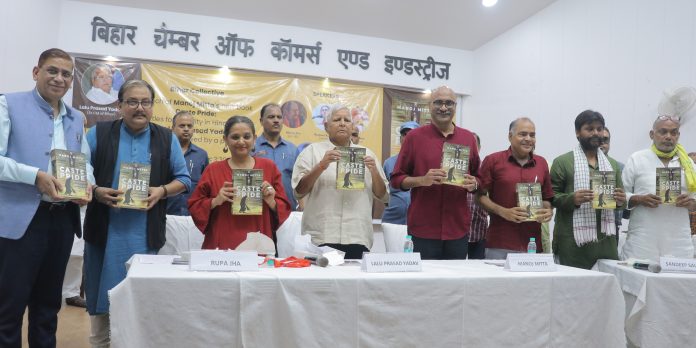– Md. Sami Ahmad
Professor Faizan Mustafa, an eminent legal educator and constitution expert, recently stirred up a hornet’s nest by making a passing remark that caste tou Islam mein bhi hai (There is caste in Islam, too). He was taking part in a panel discussion marking the release of a book, ‘Caste Pride…Battles for equality in Hindu India’ by renowned journalist Manoj Mitta at Patna on August 26. Professor Mustafa has earned fame as VC, NALSAR University of Law and he is now VC, CNLU (Chanakya National Law University) Patna.
When Professor Mustafa was questioned by someone from the audience about the source of his ‘caste in Islam’ claim, he clarified that he meant to say ‘there is a caste in Indian Islam’. Later it was mutually agreed that there is a caste issue among Indian Muslims.
Now, ‘Indian Islam’ is a problematic term, and it is aggressively challenged but that is a different issue.
It is important to note that Professor Faizan Mustafa is not alone in making this claim that sounds like stating that there is a ‘caste issue in Islam’ too.
Talking to Radiance, Professor Mustafa clarified that he was referring to the caste system among India’s and the subcontinent’s Muslim society. He said he never meant to say that there was a caste system in Islam.
However, there is an overwhelming majority who claim that there is no caste in Islam per se. The basis of this claim is the fact that no one can prove from Islam’s two prominent sources – The Holy Qur’ān and the Hadith – that there is a caste in Islam. Clearly, there is a case to register objection and complete rejection of this claim.
But to deny, and state, that there is no caste or casteism among Muslims is completely false either. This needs to be strongly stated as there are persons who are simply not ready to accept that Muslims practise casteism.
It needs to be mentioned even at the risk of repetition that claiming ‘caste in Islam’ is factually incorrect and importantly, a dilution of the real problem of casteism.
What is casteism?
Casteism is about different statuses to different castes and discrimination on this basis. It is based on some Indian scriptures and institutionalised in a way that is known as varna system. Casteism is not only untouchability. It is a denial of many equalities in society like marriage, social position and religious headship.
What Professor Faizan Mustafa terms as ‘Indian Islam’ is actually the practice of Indian Muslims. Though it is clear that casteism among Muslims is not scripture-based yet it is prevalent in practice.
If one wants to see this practice in the Muslim society, most of the matrimonial ads will suffice. It is also true that some Muslim scholars like Sir Syed Ahmad and Maulana Ashraf Ali Thanvi are accused of institutionalising caste among Muslims but the fact that they faced questions from the intellectuals, and no inter-caste marriage among Muslims can be declared as un-Islamic and invalid proves the point that it has no scripture base.
So, when someone says loosely that ‘Islam too has a caste’ actually she/he does dilute the real problem of casteism in the Indian society. First and foremost, it is because of this un-scriptured casteism that there was/is still no untouchability among Muslims. But yes, in matters of equalities like marriage, social position and religious headship, one may find the accusation of casteism among Muslims true.
Though different Muslim organisations do try to provide equal opportunities to all the castes but empirical data will prove that there is still much to be desired.
It may not be denied that there are caste scuffles among Muslims but there has never been any caste-based massacre. It is another emphatic proof that caste among Muslims is not akin to the Hindu caste system. There have been many caste massacres, all among Hindus, in Bihar alone.
What is similar among castes in Muslims and Hindus is that the backwardness is almost the same in both cases. Conversion is a truth; while some social emancipation like freedom from the curse of untouchability is sure for the Hindus converting to other religions. But their long-run backwardness is carried even after their conversion which cannot be overcome by just social emancipation.
That is why it is argued that the social status should be declared on their economic backwardness. It is therefore argued that some Muslim castes need to be included in the Scheduled Caste category.
Anthropologists opine that the caste system among Indian Muslims, in whatsoever form it exists, is the result of the influence of the varna system of the Hindu culture.




